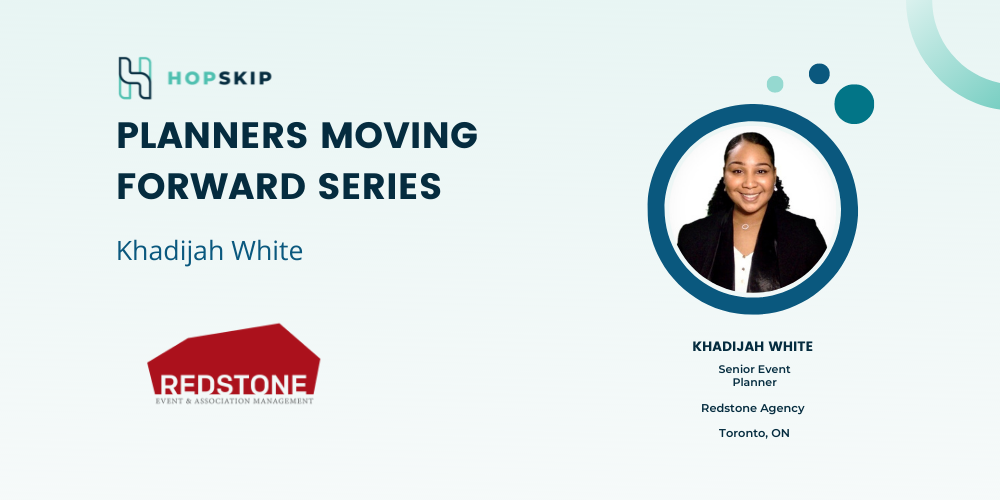This post is part of the HopSkip Planner Spotlight Series where HopSkip spotlight's planners across the industry to bring awareness of how they adapted to COVID-19, communicating and lessons learned and sharing how they are viewing the meetings and events industry in a post-pandemic world.
Name: Khadijah White
Company Name: Redstone Agency
Job Title: Senior Event Planner
Years of Experience: 3
How do you think you are positioned, after months of persevering with the pandemic, to take advantage of our new and disrupted meetings/events landscape?
After months of persevering through the pandemic, I have positioned myself to take advantage of the new event landscape by upskilling and earning my DES designation. This knowledge allowed me to have a strong foundation while navigating (and conquering!) the virtual event space. As the industry continues to evolve, I would be remised if I didn’t highlight my greatest advantage - my team. I am lucky to be working with an extremely forward-thinking and tech-savvy team (shoutout #REDSQAUD!) where I can lean on my colleague’s collective experience when servicing our clients.
As our community moves forward with planning in-person meetings, what new technologies or processes are you implementing that you may have not looked at before?
As we move towards planning more in-person events, I have noticed a shift in the expectation of our audience. Many are excited to return fully in person, however, some are not ready to leave the comfort and safety of virtual events and all the benefits they provided. More frequently, we are seeing requests to record live content for on-demand viewing as the appeal of rewatching content and having the ability to tune in when it is most convenient for your schedule and time zone is a real benefit to both the live and virtual attendees. Our virtual audience can save money on travel expenses and save time off work, while our in-person audience may find the choice between concurrent session attendance made easier if the sessions are recorded. An additional process that is becoming more popularized is the resurgence of QR codes and digital business cards. They are a convenient, and user-friendly way of information sharing in a very COVID-friendly manner.
As we see virtual meetings transition back to face to face, hybrid meetings are beginning to be the vehicle to return to normalcy. What are your thoughts on hybrid meetings versus traditional fully in-person meetings?
There is still so much to learn when it comes to hybrid events and creating a meaningful experience for both in-person and remote audiences. My opinion on this format is sure to evolve, however, currently, I see them as a benefit to event attendees and event hosts. Hybrid events provide attendees with options in terms of in what capacity they would like to attend the event. Hybrid formats can also extend your event reach far beyond the physical event destination. In comparison with traditional in-person meetings, hybrid will come with additional costs and planning considerations to ensure that both audiences are receiving a high-quality experience.
In your opinion, what do you think the biggest value for your attendees is in regards to returning to live events?
The greatest value to attendees returning in person is the organic connections and immersive experiences that can arguably only be achieved face-to-face. The hospitality industry is one that focuses on creating memorable experiences. When attending an event in person, the attendee can enjoy the experience of getting dressed up, connecting organically with peers, enjoying the glamour of a social event, and feeling the impact and presence of a powerful keynote speaker. In my opinion, live events are where events truly come to life through the five senses. While there are benefits to virtual events, for sure, there is an undeniable energy that live events possess that you cannot feel, smell or touch through a screen.
As the pandemic fades away and we return to face-to-face events what do you hope changes, either for planners or hoteliers, in the traditional RFP and proposal process as a result of all of the learnings from the last 20+ months?
Over the past 20+ months, I have learned the importance of having systems in place that can automate and streamline processes where possible. When it comes to the RFP and proposal process, I think it would be beneficial to use software that distributes and receives all RPF and proposal information in a clear, succinct, and uniform way, that can easily be digested and shared with our clients. Having this system in place would save valuable time for both planners and hoteliers.
This post is part of the HopSkip Planner Spotlight Series where HopSkip spotlight's planners across the industry to bring awareness of how they adapted to COVID-19, communicating and lessons learned and sharing how they are viewing the meetings and events industry in a post-pandemic world.
